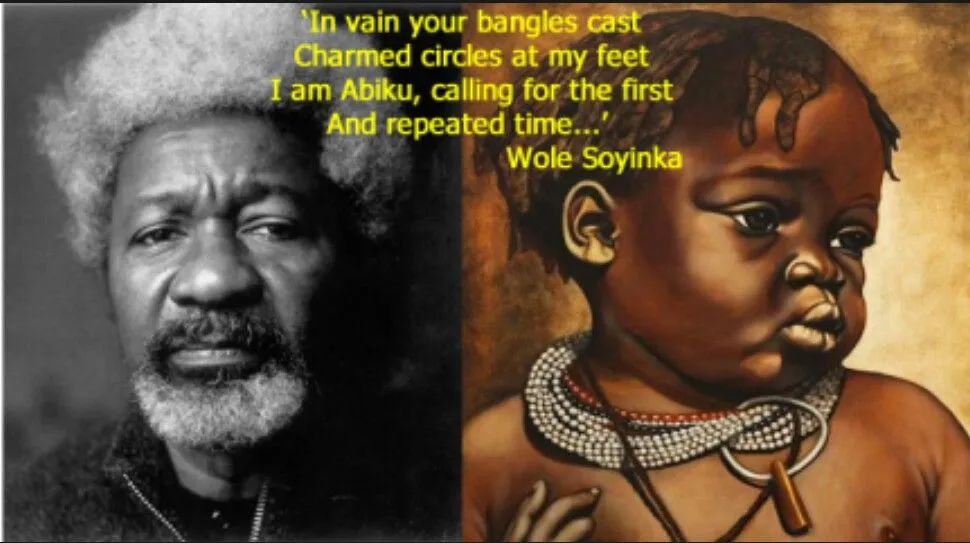Ok, like i rightly said last week that Abiku means the spirits of children who die before reaching puberty... Futhermore, a child who dies before twelve years of age being regarded an Abiku, and the spirit, or spirits, who caused the death being also called Abiku.
Abiku which also means Wanderer child. It is the same child who dies and returns again and again to plague the mother.
Going by the Yoruba mythology, "Abiku" refers to a child who dies repeatedly before puberty.
It can also be perceived as ‘predestined to death’. Which is usually Influenced by some spiritual deities
The child then dies prematurely leaving the mother miserable.
As soon as the mother gives birth again and the child posses the same physical features that the previous child has, she then puts a mark on the chest, back or face of the child. As seen in the picture below, the mark is usually put on them just so it would be easy to identify them when they are reborn or to keep them from going back into the spirit world.

After they notice the mark or similar marks on the Abiku that is rebirth, The parents then make consultations with the oracle and further appeases the spirit family of the child, tho that will be determined by the confirmation that it is from there...
Now lets go over this poem:
***ABIKU***
By Wole Soyinka
"In vain your bangles cast
Charmed circles at my feet
I am Abiku, calling for the first
And repeated time.
Must I weep for goats and cowries
For palm oil and sprinkled ash?
Yams do not sprout in amulets
To earth Abiku's limbs.
So when the snail is burnt in his shell,
Whet the heated fragment, brand me
Deeply on the breast - you must know him
When Abiku calls again.
I am the squirrel teeth, cracked
The riddle of the palm; remember
This, and dig me deeper still into
The god's swollen foot.
Once and the repeated time, ageless
Though I puke, and when you pour
Libations, each finger points me near
The way I came, where
The ground is wet with mourning
White dew suckles flesh-birds
Evening befriends the spider, trapping
Flies in wine-froth;
Night, and Abiku sucks the oil
From lamps. Mothers! I'll be the
Suppliant snake coiled on the doorstep
Yours the killing cry.
The ripest fruit was saddest
Where I crept, the warmth was cloying.
In silence of webs, Abiku moans, shaping
Mounds from the yolk."

Picture source: Google
Going by this poem, Abiku’s are seen as spirits who may possibly have families in the spiritual world.
The myth states that those spirits are hungry as no one offers sacrifices to them, like i mentioned in my former post about abiku that they often live on the trees, it is beneath this tree that people offers sacrifices and its this sacrifice that they feed on, but there's no enough food, they become really angry and In anger, they come to the physical world to eat and provide food for their spiritual family and at the peak of happiness in the physical home, they die.
Wole soyinka in that poem was trying to tell people that they are wasting their time by trying to make the abiku stay.
Lets quickly examine the themes used in the poem..
***Themes***
→→ Theme of supremacy of Abiku ←←
The poem designates lots of powers to Abiku. Because according to the poem Abiku boasted that not even the traditional rites can stop him from dying and being reborn can actually stop him. That explains 'in vain your bangles cast charmed circles at my feet' as stated in the poem.
→→ Theme of Arrogance ←←
Abiku is expressed as boastful and arrogant. He does not care about how people feel when he keeps coming and dying. He does not even have pity for the mother and family who suffers the loss and bears the pain.
→→Theme of Helplessness ←←
Everyone especially the mother is helpless as Abiku torments them. There's nothing they could do to stop Abiku, as all effort proves futile
→→Theme of Belief in the supernatural ←←
Well, the belief that it is the same child that dies that is being born, shows the belief in another world outside this. That this life is more than just the physical. Futhermore, before people are born they are somewhere, and when they die they go somewhere. Hence production of a child goes beyond the union of the sperm and egg.
This poem portrays the futility of life, meaning that man’s effort to avoid death is futile and man is a vain person....
Thanks so much for reading through, please comment, upvote and resteem
Do follow me @ambmicheal
